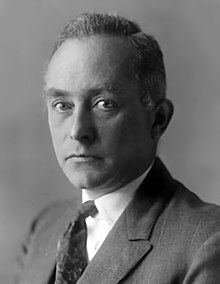 Global Information
Global InformationMax Born information
Max Born FRS FRSE | |
|---|---|
 Portrait c. 1930s | |
| Born | 11 December 1882 Breslau, German Empire (now Wrocław, Poland) |
| Died | 5 January 1970 (aged 87) Göttingen, West Germany |
| Resting place | Stadtfriedhof, Göttingen |
| Citizenship | German, British |
| Alma mater | University of Göttingen |
| Known for | Born approximation Born coordinates Born equation Born probability Born reciprocity Born rigidity Born rule Born series Born square Born–Landé equation Born–Infeld theory Born–Haber cycle Born–Huang approximation Born–von Karman boundary condition Born–Oppenheimer approximation BBGKY hierarchy Cauchy–Born rule Adiabatic theorem Canonical commutation relation |
| Spouse |
Hedwig Ehrenberg (m. 1913) |
| Children | 3, including Gustav Victor Rudolf Born |
| Relatives | Olivia Newton-John (granddaughter) Georgina Born (granddaughter) |
| Awards | Nobel Prize in Physics (1954) Hughes Medal (1950) Max Planck Medal (1948) Fellow of the Royal Society (1939) |
| Scientific career | |
| Fields | Theoretical physics |
| Institutions | University of Frankfurt University of Göttingen University of Edinburgh University of Cambridge |
| Thesis | Untersuchungen über die Stabilität der elastischen Linie in Ebene und Raum unter verschiedenen Grenzbedingungen (1906) |
| Doctoral advisor | Carl Runge |
| Other academic advisors |
|
| Doctoral students |
|
| Other notable students |
|
| Signature | |
| Special relativity |
|---|
 |
|
|
Max Born FRS, FRSE (German pronunciation: [ˈmaks ˈbɔʁn] ⓘ; 11 December 1882 – 5 January 1970) was a German-British physicist and mathematician who was instrumental in the development of quantum mechanics. He also made contributions to solid-state physics and optics and supervised the work of a number of notable physicists in the 1920s and 1930s. Born was awarded the 1954 Nobel Prize in Physics for his "fundamental research in quantum mechanics, especially in the statistical interpretation of the wave function".[1]
Born entered the University of Göttingen in 1904, where he met the three renowned mathematicians Felix Klein, David Hilbert, and Hermann Minkowski. He wrote his PhD thesis on the subject of "Stability of Elastica in a Plane and Space", winning the university's Philosophy Faculty Prize. In 1905, he began researching special relativity with Minkowski, and subsequently wrote his habilitation thesis on the Thomson model of the atom. A chance meeting with Fritz Haber in Berlin in 1918 led to discussion of how an ionic compound is formed when a metal reacts with a halogen, which is today known as the Born–Haber cycle.
In World War I he was originally placed as a radio operator, but his specialist knowledge led to his being moved to research duties on sound ranging. In 1921 Born returned to Göttingen, where he arranged another chair for his long-time friend and colleague James Franck. Under Born, Göttingen became one of the world's foremost centres for physics. In 1925 Born and Werner Heisenberg formulated the matrix mechanics representation of quantum mechanics. The following year, he formulated the now-standard interpretation of the probability density function for ψ*ψ in the Schrödinger equation, for which he was awarded the Nobel Prize in 1954. His influence extended far beyond his own research. Max Delbrück, Siegfried Flügge, Friedrich Hund, Pascual Jordan, Maria Goeppert-Mayer, Lothar Wolfgang Nordheim, Robert Oppenheimer, and Victor Weisskopf all received their PhD degrees under Born at Göttingen, and his assistants included Enrico Fermi, Werner Heisenberg, Gerhard Herzberg, Friedrich Hund, Wolfgang Pauli, Léon Rosenfeld, Edward Teller, and Eugene Wigner.
In January 1933, the Nazi Party came to power in Germany, and Born, who was Jewish, was suspended from his professorship at the University of Göttingen. He emigrated to the United Kingdom, where he took a job at St John's College, Cambridge, and wrote a popular science book, The Restless Universe, as well as Atomic Physics, which soon became a standard textbook. In October 1936, he became the Tait Professor of Natural Philosophy at the University of Edinburgh, where, working with German-born assistants E. Walter Kellermann and Klaus Fuchs, he continued his research into physics. Born became a naturalised British subject on 31 August 1939, one day before World War II broke out in Europe. He remained in Edinburgh until 1952. He retired to Bad Pyrmont, in West Germany, and died in a hospital in Göttingen on 5 January 1970.[2]
- ^ Cite error: The named reference
Nobel Prizewas invoked but never defined (see the help page). - ^ "Nobel prize winner dies". Pittsburgh Post-Gazette. (Pennsylvania, U.S.). Associated Press. 6 January 1970. p. 26.